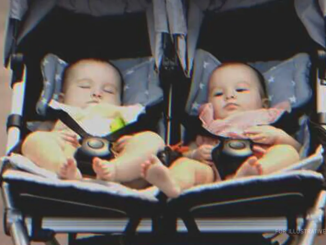
In the early 1990s, the world fell in love with the adorable Mara Wilson, the child actor known for playing the precocious little girl in family classics like Mrs. Doubtfire and Miracle on 34th Street.
The young star, who turned 37 on July 24, seemed poised for success but as she grew older, she stopped being “cute” and disappeared from the big screen.
“Hollywood was burned out on me,” she says, adding that “if you’re not cute anymore, if you’re not beautiful, then you are worthless.
In 1993, five-year-old Mara Wilson stole the hearts of millions of fans when she starred as Robin Williams’ youngest child in Mrs. Doubtfire.
The California-born star had previously appeared in commercials when she received the invitation to star in one of the biggest-grossing comedies in Hollywood history.
“My parents were proud, but they kept me grounded. If I ever said something like, ‘I’m the greatest!’ my mother would remind me, ‘You’re just an actor. You’re just a kid,’” Wilson, now 37, said.
After her big screen debut, she won the role of Susan Walker – the same role played by Natalie Wood in 1947 – in 1994’s Miracle on 34th Street.
In an essay for the Guardian, Wilson writes of her audition, “I read my lines for the production team and told them I didn’t believe in Santa Claus.” Referencing the Oscar-winning actor who played her mom in Mrs. Doubtfire, she continues, “but I did believe in the tooth fairy and had named mine after Sally Field.”
‘Most unhappy’
Next, Wilson played the magical girl in 1996’s Matilda, starring alongside Danny DeVito and his real-life wife Rhea Perlman.
It was also the same year her mother, Suzie, lost her battle with breast cancer.
“I didn’t really know who I was…There was who I was before that, and who I was after that. She was like this omnipresent thing in my life,” Wilson says of the deep grief she experienced after losing her mother. She adds, “I found it kind of overwhelming. Most of the time, I just wanted to be a normal kid, especially after my mother died.”
The young girl was exhausted and when she was “very famous,” she says she “was the most unhappy.”
When she was 11, she begrudgingly played her last major role in the 2000 fantasy adventure film Thomas and the Magic Railroad. “The characters were too young. At 11, I had a visceral reaction to [the] script…Ugh, I thought. How cute,” she tells the Guardian.
‘Burned out’
But her exit from Hollywood wasn’t only her decision.
As a young teenager, the roles weren’t coming in for Wilson, who was going through puberty and outgrowing the “cute.”
She was “just another weird, nerdy, loud girl with bad teeth and bad hair, whose bra strap was always showing.”
“At 13, no one had called me cute or mentioned the way I looked in years, at least not in a positive way,” she says.
Wilson was forced to deal with the pressures of fame and the challenges of transitioning to adulthood in the public eye. Her changing image had a profound effect on her.
“I had this Hollywood idea that if you’re not cute anymore, if you’re not beautiful, then you are worthless. Because I directly tied that to the demise of my career. Even though I was sort of burned out on it, and Hollywood was burned out on me, it still doesn’t feel good to be rejected.”
Mara as the writer
Wilson, now a writer, authored her first book “Where Am I Now? True Stories of Girlhood and Accidental Fame,” in 2016.
The book discusses “everything from what she learned about sex on the set of Melrose Place, to discovering in adolescence that she was no longer ‘cute’ enough for Hollywood, these essays chart her journey from accidental fame to relative (but happy) obscurity.”
She also wrote “Good Girls Don’t” a memoir that examines her life as a child actor living up to expectations.
“Being cute just made me miserable,” she writes in her essay for the Guardian. “I had always thought it would be me giving up acting, not the other way around.”
What are your thoughts on Mara Wilson? Please let us know what you think and then share this story so we can hear from others!
I Was Heartbroken When I Accidentally Found Out Why My Husband Stopped Inviting Me to Dinners With His Friends

Mandy and Jack appeared to have the ideal marriage—carefree and childless. Along with many social interactions, they went on adventures together with Jack’s childhood pals. But that was three months ago. Jack began apologising for not include Mandy in activities, saying they were “just for the guys.”
Even though Mandy at first agreed with his logic, a fortuitous meeting with Jack’s buddy Kevin’s wife Marcia exposed a startling untruth. Marcia had learned from Jack that Mandy was undergoing IVF treatments. Confused, Mandy made the decision to look into it more.
https://googleads.g.doubleclick.net/pagead/ads?client=ca-pub-3764810839868565&output=html&h=183&slotname=2267562348&adk=970425173&adf=3190354958&pi=t.ma~as.2267562348&w=730&abgtt=6&fwrn=4&lmt=1724521165&rafmt=11&format=730×183&url=https%3A%2F%2Favokaddo.com%2F2024%2F07%2F23%2Fi-was-heartbroken-when-i-accidentally-found-out-why-my-husband-stopped-inviting-me-to-dinners-with-his-friends%2F%3Ffbclid%3DIwY2xjawE2-hxleHRuA2FlbQIxMAABHXpmTellbjCRCLJpcytSndhsqrHNgv4zdmNLr2JNFEL942VWDeN25oAfpQ_aem_xCEcL1ylAfctFWSpFNptPA&wgl=1&uach=WyJXaW5kb3dzIiwiMC4zLjAiLCJ4ODYiLCIiLCIxMDkuMC41NDE0LjE2OCIsbnVsbCwwLG51bGwsIjY0IixbWyJOb3RfQSBCcmFuZCIsIjk5LjAuMC4wIl0sWyJHb29nbGUgQ2hyb21lIiwiMTA5LjAuNTQxNC4xNjgiXSxbIkNocm9taXVtIiwiMTA5LjAuNTQxNC4xNjgiXV0sMF0.&dt=1724521164837&bpp=1&bdt=245&idt=277&shv=r20240821&mjsv=m202408210101&ptt=9&saldr=aa&abxe=1&cookie=ID%3Dd6f422181fa8e320%3AT%3D1712754368%3ART%3D1724516339%3AS%3DALNI_MbQ8K8Uz_tQiOWk9_ho73iGWbUvXg&gpic=UID%3D00000de663175333%3AT%3D1712754368%3ART%3D1724516339%3AS%3DALNI_MZzkvLBsYSBf99BTmrLqXAWredf6A&eo_id_str=ID%3D880422cb866d8cdc%3AT%3D1712754368%3ART%3D1724516339%3AS%3DAA-AfjYIkHBaiiV25sK_LhuhTK3y&prev_fmts=0x0%2C1100x280%2C730x183&nras=1&correlator=3991718307930&frm=20&pv=1&rplot=4&u_tz=420&u_his=1&u_h=768&u_w=1360&u_ah=728&u_aw=1360&u_cd=24&u_sd=0.8&dmc=8&adx=131&ady=2002&biw=1362&bih=730&scr_x=0&scr_y=0&eid=44759875%2C44759926%2C44759837%2C44798934%2C95334830%2C95336914%2C95338229%2C31086467%2C95339860&oid=2&pvsid=4226233359002572&tmod=1045117570&uas=0&nvt=1&ref=https%3A%2F%2Fl.facebook.com%2F&fc=1920&brdim=168%2C24%2C168%2C24%2C1360%2C0%2C1123%2C704%2C1383%2C730&vis=1&rsz=%7C%7CopeEbr%7C&abl=CS&pfx=0&fu=128&bc=31&bz=0.81&psd=W251bGwsbnVsbCxudWxsLDNd&ifi=4&uci=a!4&btvi=2&fsb=1&dtd=282
Mandy discovered at home an invitation to a dinner party that Jack had failed to disclose. She sent out a double RSVP, ready to face whatever Jack was concealing. She took Jack by surprise the night of the dinner, showing him where it was without giving it away. As they got there and encountered their friends’ uncomfortable quiet, his uncertainty escalated to shock. Jack kept this information secret since Sasha, his ex-girlfriend, recently got married to one of his best buddies.
Sasha was often talking about Jack at dinner, which made things tense. Mandy started to suspect an affair as her mind raced. Mandy knew all too well that Sasha had insisted on Mandy’s absence from the activities because of past pettiness, as Jack revealed on the trip home. While acknowledging his mistake in concealing Sasha’s involvement, Jack insisted he had no romantic relationship with her.
Jack apologized once more while making tea at home. He was subsequently approached by Mandy over the IVF hoax. Jack shyly said that he had made it up in response to peer pressure because he didn’t want to have to justify their childless lifestyle. They both agreed that it was ridiculous, reaffirmed their choice to not have children, and made plans to improve their communication going forward. Their love for one another endured in the face of chaos.



Leave a Reply